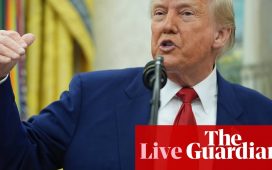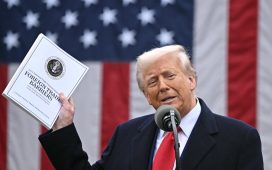Global cost of 2025 tariff war could reach $1.4tn, report finds
A full-blown trade war between the US and its trading partners could cost $1.4tn, a new report shows.
Economists at Aston Business School have modelled a range of potential scenarios, including the possibility that America it hit by full global retaliation after it announces new tariffs against other countries.
That full-scale trade conflict could result in a $1.4 trillion global welfare loss, Aston has calculated.
The report explains that tariff escalation leads to higher prices, reduced competitiveness, and fragmented supply chains, as we saw in 2018 in the US-China trade war.
It says:
Donald Trump’s 2025 return to power has unleashed a gale of protectionism, reshaping global trade within weeks.
They outline six scenarios, from the first wave of tariffs already announced against Canada, Mexico and China to a full-blown trade war.
Here are the key findings:
-
US initial tariffs: US prices rise 2.7% and real GPD per capita declines 0.9%. Welfare declines in Canada by 3.2% and Mexico by 5%.
-
Retaliation by Canada, Mexico and China: US loss deepens to 1.1%, welfare declines in Canada by 5.1% and Mexico by 7.1%.
-
US imposes 25% tariffs on EU goods: Sharp transatlantic trade contraction, EU production disruptions, US welfare declines 1.5%.
-
EU retaliates with 25% tariff on US goods: Prices rise across US and EU, mutual welfare losses and intensified negative outcomes for the US. UK experiences modest trade diversion benefits.
-
US global tariff: Severe global trade contraction and substantial price hikes substantially affect North American welfare and UK trade volumes.
-
Full global retaliation with reciprocal tariffs: Extensive global disruption and reduced trade flows, severe US welfare losses, $1.4 trillion global welfare loss projected.
The full-blown trade war (scenario 6) would have “profound implications” for interconnected economies like the UK.
The report says:
As a trade-dependent nation navigating post-Brexit realities, the UK stands at a crossroads. Trump’s tariffs disrupt supply chains and exports, yet might open doors for rerouting, with high potential for exporting much more to the U.S.
The dual-edged impacts are stark: fleeting export gains collide with vulnerabilities in critical sectors like automotive and tech, while EU divergence risks, amplified by regulatory misalignment and political distrust, threaten its efforts in resetting the UK-EU relationship.
So while the UK can use its post-Brexit flexibility to mitigate risks and leverage new trade routes, sustained gains depend on rebuilding EU ties and supporting a rules-based international trade order, they add.
Key events
BoE’s Greene: trade war uncertainty could hurt dollar’s reserve status
Bank of England interest rate setter Megan Greene has warned that the US dollar’s status as the global reserve currency could be hurt by trade war uncertainty.
Greene said she thought a trade war involving retaliatory tariffs would probably be disinflationary for Britain’s economy.
Exchange rates were likely to be a key way the effect of trade wars would be transmitted across economies, Greene explained, adding:
“It’s also possible that the dollar’s role as a global reserve currency could be undermined a little bit by all of the uncertainty that we’re seeing, and so we don’t know how the exchange rate will behave.”
Von der Leyen: EU will retaliate against US tariffs if necessary

Lisa O’Carroll
The EU will react strongly to any reciprocal tariffs the US may impose on its exports, Ursula von der Leyen, European Commission president has warned.
Von der Leyen says in a speech on Tuesday:
“Europe has not started this confrontation. We do not necessarily want to retaliate, but we have a strong plan to retaliate if necessary.
Our objective is a negotiated solution. But of course, if need be, we will protect our interests, our people, and our companies.”
“Our objective is a negotiated solution. But of course, if need be, we will protect our interests, our people and our companies. I want to be very clear on the aim of our response. We think that this confrontation is in no one’s interest. The flow of goods and services between us is nearly balanced. We are willing to work on the trade balance of goods as well as services.
This is the largest and most prosperous trade relation worldwide. We would all be better off if we could find a constructive solution.”
Welcome news in the eurozone: inflation has ticked down to 2.2% in March, from 2.3% in February.
The drop was due to lower energy prices – which fell by 0.7%, following a 0.2% rise in February.
Services inflation slowed to 3.4%, from 3.7%, although food, alcohol & tobacco inflation picked up to 2.9%, from 2.7%, and goods prices rose by 0.6% having been unchanged in February.
But a global trade war could have implications for prices in the eurozone, and beyond.
ING economist Bert Colijn explains:
Uncertainty around the short-term outlook for inflation remains very high. US tariffs could result in deflationary pressures on the eurozone market as they depress exports and therefore growth. Besides that, it also results in more supply in the eurozone market as the US increases barriers to access.
Retaliatory measures from the European Commission will likely have an upward effect on eurozone inflation, though, as they are essentially a domestic tax that gets introduced and will be paid for by consumers to some extent.
Elsewhere in the data world, the UK’s statistics regulator has criticised the Department for Work and Pensions for a misleading claim about the rise in people receiving disability benefits.
The Office for Statistics Regulation says it was “entirely misleading” to claim in a recent press release that the number of people claiming disability elements of Universal Credit has increased by 383% in the last five years.
Rob Kent-Smith, deputy head of the Office for Statistics Regulation, wrote in a letter to Sir Peter Schofield, Permanent Secretary at the DWP:
The figure does not recognise that the majority of this increase is due to the process of migrating people from legacy benefits, such as Employment and Support Allowance, to Universal Credit over the last few years. When these people are accounted for, the actual increase in the number of people claiming disability elements of Universal Credit is 50%.
After we raised concerns with DWP, the press release was amended on 27th March. The updated version of the press release includes some references to people moving from other benefits and acknowledges that the number of people with no requirement to look for work across Universal Credit health and other benefits since the pandemic has increased by 50%.
However, we consider that these additions do not go far enough.
Kent-Smith is asking the DWP to update the press release by Friday to remove references to the 383% figure, and not use the figure again.
OBR chief Hughes would like to serve second term

Heather Stewart
Over at parliament, Richard Hughes has told MPs that he has let the chancellor know that he would like to serve a second five year term as chair of the Office of Budget Responsibility.
Appearing before MPs on the cross-party Treasury select committee to discuss last week’s spring statement, Hughes was asked whether he would like to stay in the post, after his first term ends on 3 October.
He replied:
“I have written to the chancellor, to the effect that I would be interested in serving a second and final term, earlier this year.”
Asked whether he had heard back from Rachel Reeves, he said he hadn’t, but added:
“I appreciate that the chancellor has a lot on her plate at the moment”.
The OBR’s role in economic policymaking has come under intense scrutiny in recent weeks, as Reeves implemented spending cuts to ensure she is on course to meet her fiscal rules – including £500m of last minute welfare reforms, after the OBR rejected the government’s costing of its plans.
Hughes also sought to reassure committee chair Meg Hillier that he did not believe leaks of aspects of the forecast before the spring statement had come from within the OBR. “I am satisfied that the OBR is not the source,” he said, adding that the Treasury had commenced its own leak inquiry.
China-US shipping rates rising ahead of new tariffs

Joanna Partridge
Rates for shipping containers from China to the United States are rising ahead of “tariff day” according to new figures from shipping analytics firm Xeneta.
The cost of shipping goods to the east coast of the US is up by 9% ($322 for a forty-foot equivalent unit (FEU), a standard shipping container), while it has jumped 16% to the west coast of the US to $383/FEU, Xeneta data shows.
“We live in a volatile market so, while the general direction of travel has been downward for spot rates from the Far East to the US since 1 January, we should expect some bumps in the road,” said Peter Sand, chief analyst at Xeneta.
Average spot rates on container ship journeys from the Far East to the US are expected to increase by $300 – $600 per FEU as a result of General Rate Increases (GRI) by shipping firms. A GRI is the amount by which ocean carriers increase their base rate on certain trade routes, usually to cover rising operating costs and to make sure that shippers remain profitable on certain routes.
Sand added:
“Carriers will chance their arm and push GRIs during times of heightened uncertainty. Nervousness in the market means they can have some success too, even if it seems to defy the underlying balance of supply and demand.”
The full-scale trade war outlined in Aston University’s report involves the US imposing extensive tariffs (25% across the board, except 10% on Canadian energy and an additional 20% on China) – and all affected countries retaliating equivalently.
In that scenario, there will be “severe disruptions to global trade are observed”, leading to the $1.4tn of damage to the global economy.
The report explains that this scenario would hurt US trade particularly badly:
The US experiences substantial declines, with exports down 66.2%, imports down 46.3%, and significant welfare losses (-2.5%), alongside notable domestic price increases (5.5%). Canada and Mexico suffer pronounced trade contractions (exports falling by approximately 32.6% and 35.0%, respectively) and face substantial welfare reductions (Canada: -4.9%, Mexico: -6.6%).
Major economies like Germany, China, Japan, and the UK also report reduced trade volumes, diminished domestic output, and welfare losses, though less severe compared to North America. The UK specifically sees exports down by 7.0%, imports down by 5.2%, and a welfare loss of 0.5%.
These results underline the significant negative global economic consequences of comprehensive tariff escalations and retaliatory measures.
Tariffs could badly hurt Ireland’s pharmaceutical exports

Lisa O’Carroll
Ireland could lose half its pharmaceutical sales to the US if tariffs of 20% are imposed by Donald Trump on exports from the EU, the government will be told today.
It would leave a €29bn gap in the economy, my colleague Lisa O’Carroll reports from Dublin.
“We don’t want to be in that space,” said Simon Harris, the deputy prime minister, as he arrived for a cabinet meeting this morning.
Harris added:
“Over a five year period, if the EU imposed a tariff of around 20% and the US imposed a tariff around 20% you could, over a five year period see a very significant reduction up to around half in the amount of pharmaceutical products we’re exporting.”
Ireland is seen as particularly exposed to Trump’s attempt at shock therapy after its huge pharmaceutical sector was singled out as a target in his efforts to repatriate jobs and tax.
Pharma and medical devices manufacturing are the backbone of US investment in Ireland, responsible for €58bn of the country’s €72bn exports to the US in 2024.
Pfizer, Amgen, Johnson & Johnson, Merck Sharp and Dohme, Abbvie and Bristol Myers Squibb are among the owners of 90 pharma plants in Ireland.
Harris said a trade war was “regrettable” and would fundamentally alter the EU and US relationship.
Global cost of 2025 tariff war could reach $1.4tn, report finds
A full-blown trade war between the US and its trading partners could cost $1.4tn, a new report shows.
Economists at Aston Business School have modelled a range of potential scenarios, including the possibility that America it hit by full global retaliation after it announces new tariffs against other countries.
That full-scale trade conflict could result in a $1.4 trillion global welfare loss, Aston has calculated.
The report explains that tariff escalation leads to higher prices, reduced competitiveness, and fragmented supply chains, as we saw in 2018 in the US-China trade war.
It says:
Donald Trump’s 2025 return to power has unleashed a gale of protectionism, reshaping global trade within weeks.
They outline six scenarios, from the first wave of tariffs already announced against Canada, Mexico and China to a full-blown trade war.
Here are the key findings:
-
US initial tariffs: US prices rise 2.7% and real GPD per capita declines 0.9%. Welfare declines in Canada by 3.2% and Mexico by 5%.
-
Retaliation by Canada, Mexico and China: US loss deepens to 1.1%, welfare declines in Canada by 5.1% and Mexico by 7.1%.
-
US imposes 25% tariffs on EU goods: Sharp transatlantic trade contraction, EU production disruptions, US welfare declines 1.5%.
-
EU retaliates with 25% tariff on US goods: Prices rise across US and EU, mutual welfare losses and intensified negative outcomes for the US. UK experiences modest trade diversion benefits.
-
US global tariff: Severe global trade contraction and substantial price hikes substantially affect North American welfare and UK trade volumes.
-
Full global retaliation with reciprocal tariffs: Extensive global disruption and reduced trade flows, severe US welfare losses, $1.4 trillion global welfare loss projected.
The full-blown trade war (scenario 6) would have “profound implications” for interconnected economies like the UK.
The report says:
As a trade-dependent nation navigating post-Brexit realities, the UK stands at a crossroads. Trump’s tariffs disrupt supply chains and exports, yet might open doors for rerouting, with high potential for exporting much more to the U.S.
The dual-edged impacts are stark: fleeting export gains collide with vulnerabilities in critical sectors like automotive and tech, while EU divergence risks, amplified by regulatory misalignment and political distrust, threaten its efforts in resetting the UK-EU relationship.
So while the UK can use its post-Brexit flexibility to mitigate risks and leverage new trade routes, sustained gains depend on rebuilding EU ties and supporting a rules-based international trade order, they add.
UK factory output shrinks as tariffs hammer sentiment
Ouch: UK manufacturing production contracted at a faster pace in March, as new orders declined at the sharpest rate for 19 months, new data shows.
The latest healthcheck on Britain’s factories shows March was a rough month. Output and new orders fell at a faster rate, as business confidence slumped to its lowest in nearly two and a half years.
Concerns about government policy, rising costs, increased geopolitical tensions and potential tariff uncertainty are all hurting, the survey of purchasing managers shows.
Fears of tariffs may also have hurt demand: new export business contracted for the thirty-eighth successive month in March, and at the quickest pace since August 2023.
Rob Dobson, director at S&P Global Market Intelligence, says:
“March proved to be another tough month for UK manufacturers.
Output contracted at the quickest pace since October 2023, as new business growth fell at the steepest rate for one-and-a-half years, suffering one of its sharpest falls since the pandemic lockdown of 2020. “Companies are being hit on several fronts. Many reported that domestic market conditions are deteriorating, costs are rising due to changes in the national minimum wage and national insurance contributions, geopolitical tensions are intensifying, and global trade faces potential disruptions from tariffs.
Although the impact on production volumes was widespread across industry, it was again small manufacturers that took the hardest knock.
The outlook is also darkening, with overall business optimism plunging to its lowest levels since late-2022. Fears about current and future performance put manufacturers on an increasingly cost cautious footing, with employment, stock holdings and purchasing all falling as companies looked to work leaner and protect cash flow, margins and competitiveness. Many firms are clearly hunkering down as they expect difficulties to continue in the coming months
Eurozone factory output rises for first time since 2023
Encouraging news: eurozone factory output has risen for first time in two years.
The latest poll of purchasing managers across Eropean factories shows that output rose, narrowly, in March, and at the fastest rate in almost three years.
That could be a sign that demand picked-up as customers tried to avoid new US tariffs, although new orders did continue to fall, at a slower rate.
Dr. Cyrus de la Rubia, chief economist at Hamburg Commercial Bank, says:
“Things are looking up. The PMI has increased for the third month in a row and the output index even surpassed the threshold for growth. A significant part of this movement may have to do with the frontloading of orders from the U.S. ahead of the tariffs, which means some backlash is to be expected in the coming months.
However, given the geopolitical developments, there is also increasing speculation that the defense sector will expand significantly over the next few years, with direct and indirect positive effects on the industry.
Tesla’s sales in France and Sweden have fallen year-on-year for a third consecutive month in March, new data shows.
Tesla registered 3,157 car sales in France and 911 in Sweden in March, dropping respectively 36.83% and 63.9% from last year, Reuters reports.
The group’s market share in France dropped to 1.63% in the January-March quarter, and lost ground to brands not accounted for by the PFA, including China’s BYD.
This follows a tough February for Tesla in Europe, where sales almost halved.
Starmer: Discussions with US are well advanced
Keir Starmer has said this morning that talks with the US on a trade deal with the US are “well advanced”.
The UK PM told Sky News that progress was being made towards a deal that would help Britain avoid nnew US tariffs, saying:
“We are discussing economic deals.
“These would normally take months or years, and in a matter of weeks, we’ve got well advanced in those discussions.”
Update: Steven Swinford of The Times reports that the deal is ‘ready to sign’, but the US won’t want to put pen to paper until Trump has announced his new tariffs.
[that would allow both sides to claim a success when the signing occurs].
Swinford also reports that the UK has agreed to drop the Digital Services Tax, which is levied on US tech firms, and promised a ‘light-touch’ approach to AI regulation.
Here’s what we know about the UK’s economic deal with the US so far:
* It’s on the table and ready to sign. There’s broad agreement, although some details are being finessed. But US is refusing to sign it until after hitting UK with tariffs on April 2, aka Liberation Day
* The…
— Steven Swinford (@Steven_Swinford) April 1, 2025
European corporate distress at six-month high
In a worrying sign, corporate distress across Europe has hit its highest level in six months.
The latest Weil European Distress Index (WEDI) shows there were paticularly sharp increases in companies hitting trouble in Germany and the UK in February
The report shows:
-
Retail & Consumer Goods: Corporate distress in this sector has surged to its highest level since October 2014, spurred by global uncertainty, fears of an economic slowdown, and cost-of-living pressures. This has resulted in poor investment and liquidity metrics, with profitability declining sharply across the sector.
-
Industrials: Distress in the industrial sector has hit its highest level since October 2020, driven by investment pressures and falling global demand, particularly in Germany’s export-driven economy. Elevated capital costs have compounded the strain.
-
Germany: Distress in Germany has reached its highest level since July 2020, driven by weak investment, poor profitability, falling valuations, and a sharp downturn in exports, manufacturing, and domestic consumption. The downturn in 2025 has been sharper than initially expected.
-
UK: Corporate distress in the UK has risen to its highest level since September 2023, driven by growing economic uncertainty, tighter liquidity, and concerns over investment following changes to National Insurance and the National Living Wage.
Grocery inflation across the UK has edged up, in a blow to households.
Market researcher Kantar has reported that annual grocery price inflation inched up to 3.5% in March, up from 3.3% in February.
TESCO SALES UP 5.4% IN 12 WEEKS TO MARCH 23 YEAR-ON-YEAR, SAINSBURY’S SALES UP 4.1%, SAYS KANTAR
— PiQ (@PiQSuite) April 1, 2025
ASDA SALES DOWN 5.6% IN 12 WEEKS TO MARCH 23, MORRISONS SALES UP 0.6%, SAYS KANTAR
ALDI UK SALES UP 5.6% IN 12 WEEKS TO MARCH 23, LIDL GB SALES UP 9.1%, SAYS KANTAR
OCADO SALES UP 11.2% IN 12 WEEKS TO MARCH 23, SAYS KANTAR
— PiQ (@PiQSuite) April 1, 2025
European stock markets rally
Shares are pushing higher across Europe, a day after trade war fears triggered some heavy falls.
In London, the FTSE 100 share index is up 53 points, or 0.6%, at 8636, rising from a two-week low.
Germany’s DAX has gained 1%, while France’s CAC index is up 0.8%.
Kathleen Brooks, research director at XTB, says:
What a difference a day makes, European stocks have bounced at the start of the new quarter and indices are a sea of green. The Eurotosxx 600 index is higher by 1%, eroding some of Monday’s losses.
Brooks warns, though, that markets remain ‘jittery’,
The focus is on the US reciprocal tariff announcement that is due tomorrow. At this stage, hopes are that a recovery rally could take hold if Trump’s tariff announcements are seen as the final move from the White House in its trade war, and if the new levies are reasonably easy to comply with.
The downside risk for stocks could emerge once more if Trump suggests that even more tariffs could be coming down the line or if there is a lack of clarity about reciprocal tariffs in the announcement.
Markets are hoping for a clean decision, that allows traders to move on from tariffs.








